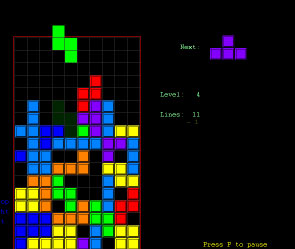All Trought about politic at Ukraine
Home » 2009 September 3 » "Tetris" beneficial effect on the mind
11:05 "Tetris" beneficial effect on the mind | |
 The popular computer game "Tetris" increases the efficiency of the brain, U.S. researchers found. They put the experiment on a group of adolescent girls and studied the changes in their brain with imaging.As it turned out, the regular game of Tetris is to increase the thickness of the cerebral cortex and increase its efficiency. In particular, participated in the experiment, children were reported changes in brain areas responsible for complex, coordinated movements as well as the brain's ability to link information that comes through different channels - visual, auditory and tactile.In addition, increased productivity of the brain in solving issues related to rational thinking and language. Now scientists hope to find out how computer games affect other qualities of the brain, such as memory, speed of information processing and spatial imagination.On this topicPortrait of a modern gamer distressed doctorsVideo games help hopeless "four-eyes"News AutoUAZ is preparing a new SUVAll the studies involved 26 girls aged 12-15 years. Within three months, half an hour a day, 15 of them were playing Tetris, and 11 others entered in the control group, which compared the state participating in the experiment.It reminds RIA Novosti, "Tetris" is one of the most popular computer games among people of all ages. In June this year, it celebrated its 25-year anniversary.The creator of the game - Alexey Pajitnov - came up with "Tetris" in the mid 90-ies of the last century, working member of the Computing Center of Academy of Sciences of the USSR and working on the problems of artificial intelligence and speech recognition. The popular computer game "Tetris" increases the efficiency of the brain, U.S. researchers found. They put the experiment on a group of adolescent girls and studied the changes in their brain with imaging.As it turned out, the regular game of Tetris is to increase the thickness of the cerebral cortex and increase its efficiency. In particular, participated in the experiment, children were reported changes in brain areas responsible for complex, coordinated movements as well as the brain's ability to link information that comes through different channels - visual, auditory and tactile.In addition, increased productivity of the brain in solving issues related to rational thinking and language. Now scientists hope to find out how computer games affect other qualities of the brain, such as memory, speed of information processing and spatial imagination.On this topicPortrait of a modern gamer distressed doctorsVideo games help hopeless "four-eyes"News AutoUAZ is preparing a new SUVAll the studies involved 26 girls aged 12-15 years. Within three months, half an hour a day, 15 of them were playing Tetris, and 11 others entered in the control group, which compared the state participating in the experiment.It reminds RIA Novosti, "Tetris" is one of the most popular computer games among people of all ages. In June this year, it celebrated its 25-year anniversary.The creator of the game - Alexey Pajitnov - came up with "Tetris" in the mid 90-ies of the last century, working member of the Computing Center of Academy of Sciences of the USSR and working on the problems of artificial intelligence and speech recognition.
| |
|
| |
| Total comments: 0 | |
Section categories | ||||||||
|---|---|---|---|---|---|---|---|---|
|
Log In |
|---|
Search |
|---|
Calendar |
|---|
Entries archive |
|---|
Our poll |
|---|
Statistics |
|---|
Total online: 1 Guests: 1 Users: 0 |
Site friends |
|---|
